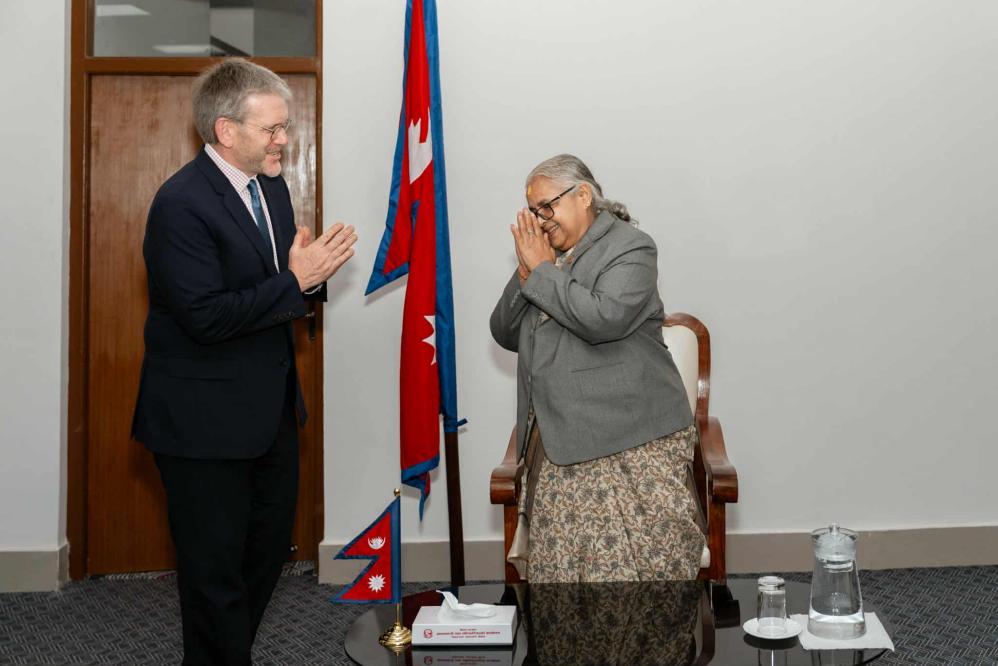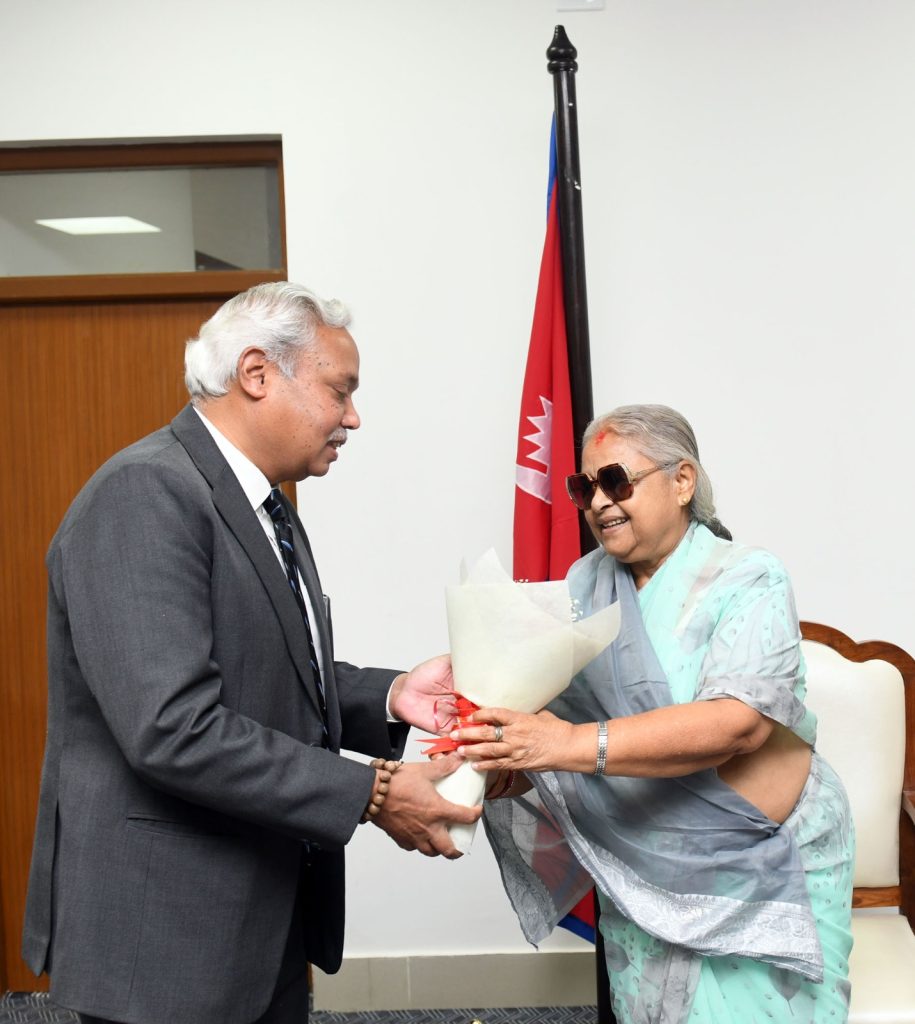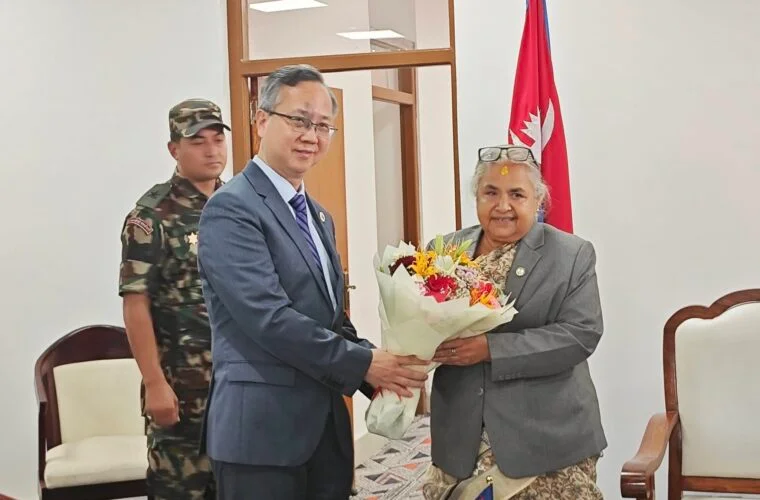
After Sushila Karki assumed office as Nepal’s first woman and 42nd overall Prime Minister, questions quickly arose about the country’s foreign policy direction during this critical time.
The Gen-Z-led protest turned violent, uprooting the basis of Nepal’s traditional political parties that have been ruling the country for many decades. Youth groups who propelled the movement were also central in placing Karki as the Prime Minister. The key question now is whether this political change will also bring a shift in Nepal’s foreign policy, or whether it merely reflects a reshuffling of leaders and parties.
Article 51(m) of Nepal’s Constitution states that foreign policy must be “independent, based on the Charter of the United Nations, non-alignment, the principles of Panchsheel, international law and norms of world peace,” while safeguarding sovereignty, territorial integrity, independence, and national interests. In practice, however, Nepal’s foreign relations have often been shaped by the ideological orientations of ruling parties, affecting ties with both neighbors and the wider international community.
Dr. Monalisa Adhikari, Senior Lecturer in International Politics at the University of Stirling in the UK, commented that the interim government has multiple domestic priorities, notably holding elections within the next six months. “However, this interim transitional period also provides key opportunities for revitalising Nepal’s foreign policy. Given that this movement was driven by demands for transparency, accountability, and economic redistribution, the interim government should appoint a capable, experienced diplomat as Foreign Minister,” said Adhikari.
She added that recalling ambassadors appointed through political patronage could demonstrate a shift toward merit-based, transparent diplomacy. At the same time, she noted, extra-constitutional transitional arrangements for stability and peace can raise concerns about democracy.
At the end of the day, it is the elected politicians who utilize foreign policy, and Nepal now has new people in the political sphere. In normal times, foreign policy tends to be stable, but these are not normal times. In the past, established political parties and public institutions governed and conducted foreign policy. Today, Gen Z has entered the political scene without a concrete foreign-policy stance. Regardless, Nepal’s Constitution remains in force and already sets out the nation’s foreign-policy principles.
Formed under Article 61 of the Constitution, the current government should, in principle, keep foreign policy anchored to the constitution, leaving little room for major departures; adventurism beyond that framework would carry consequences for the Nepali state. Yet the other side of the coin is stark: the protests have produced a grave political crisis, with severe damage to infrastructure and the economic base. As foreign-policy analyst Chandra Dev Bhatta notes, “Under these circumstances, Nepal needs international support to rebuild the country and revive the economy. That can happen only if we assure the international community that Nepal is safe for investment, providing economic security as well as political stability, and delivering good governance, which has been a core demand of the Gen-Z protests.”
Failing that, Nepal risks losing existing foreign investment. Therefore, a core foreign-policy priority should be to insulate the economic front from changes in politics and to provide security to investors.

“We must win the confidence of the international community and investors,” Bhatta said. “The Sushila Karki government is backed by forces without clear ideological labels (such as left or right). That can help, but it can also hinder. Some countries may hesitate to engage because they don’t yet know who they are or how they will respond. The government, or the incoming foreign minister, needs to clarify this.”
“We should keep foreign policy out of politics. If we mix politics with foreign policy or pursue any geopolitical adventurism, that will be suicidal. Given the scale and nature of the crisis and the way the regime change occurred, Nepal faces added complexities. Still, we must remember that domestic politics and foreign policy are distinct arenas with different consequences.”
While shifts in domestic politics can reshape governments and regimes, foreign-policy adventurism risks Nepal’s sovereignty and territorial integrity. Given that this is an interim government, its mandate to alter Nepal’s foreign-policy orientation is limited, Bhatta added. Karki should work closely with the international community to prepare for the elections. Support from foreign partners will be more vital than ever, especially after the recent protests damaged infrastructure and the broader economy.
Dr. Nishchal N. Pandey, Director of the Centre for South Asian Studies in Kathmandu, noted that the current setup is an interim arrangement, even as regional and global challenges are evolving rapidly. “We must be able to respond adequately and in real time. November–December is the peak tourist season. Our missions must portray trekking routes as safe and secure. We also need international support for the elections,” Pandey said.
Prof. Dr. Meena Vaidya Malla, former head of the Department of Political Science at Tribhuvan University, said the interim government should maintain balanced relations grounded in the Panchsheel principles. She added, “The foreign ministry should be led by experts having no political affiliations or projection. Stick to principles and ensure the proper use of foreign aid and assistance. Technical issues should never be politicized; keep them purely development-oriented and sustainable.”
The Karki government’s core mandate is to hold the election on March 5 next year. To do so, it must win the trust of its neighbours—India and China—as well as development partners and key bilateral and multilateral institutions.
Dealing with Elephants and Dragon
A key challenge for the Karki government is to handle its two neighbours—India and China. Today, with India-China ties significantly improved, it is an opportune moment to prioritise development cooperation over geopolitical business. Last month, China’s Foreign Minister Wang Yi visited New Delhi, and this month, Indian Prime Minister Narendra Modi visited China to participate in the Shanghai Cooperation Organisation Summit. These are signs of the two building a relationship.
Dr. Nihar R. Nayak, a research fellow at IDSA in New Delhi, said Nepal should engage India and China separately and build trust with each on its own terms. “It would not be correct to deal with India and China in the same way trilaterally. Nepal should deal with New Delhi separately,” he said.
Recent developments, including the trade agreement between India and China, show that trust in our neighbourhood remains thin. Diplomatic niceties aside, each capital has its own worldview. Without common positions on key issues, the trilateral relationship we envision is unrealistic. Nepal should therefore deal with them separately.

There is a strong case that Nepal cannot relate to India and China in identical ways. The ideas of “equidistance” or “equi-proximity” are misleading. Both rest on geography, but state relations go beyond distance. In an era of modern transport, geography matters less. As Chandra Dev Bhatta notes: “While China is our neighbour with whom we share a border and trade, India is not the same case. There is a civilizational bond we do not share with China to the same degree. Of course, there are cultural exchanges with China, but they are not equivalent to those with India. We must recognise these realities, which China understands, and does not see as a problem if Nepal is closer to India. It is politics that creates friction; we should avoid that. Only then can we engage meaningfully with both China and India.”
Fostering trilateral relations with India and China demands balance, pragmatism, and strategic autonomy. As the classic “yam between boulders,” Nepal should position itself as a bridge, not a battleground. The strategy should emphasise issue-based cooperation in non-sensitive sectors such as trade, hydropower, connectivity, climate action, and disaster management, where interests converge.
Nepal can revive academic and policy-level dialogues leading to formal trilateral platforms, while leveraging multilateral forums like the SCO, SAARC, and BIMSTEC to expand cooperative space. Economic diplomacy should be central, positioning Nepal as a transit hub linking South and East Asia. At the same time, Nepal must safeguard its sovereignty through a “non-alignment-plus” posture, engaging both neighbours while resisting pressure to choose sides. Ultimately, trilateralism should be anchored in shared prosperity, and cooperation should be framed as a win-win model that benefits the entire region. Foreign policy should also be centred on equidistant, equivalent, and equicentric diplomacy.
Dr. Hindu Sanskriti Karki, an international politics expert, supports trilateral engagement, so long as Nepal acts as a complementary partner, not a proxy. “Nepal must assure both India and China that its actions are guided by national interests, not by non-state actors, and that it poses no security threat to either,” she said.
On India, long-standing issues require urgent attention, even if some concessions are needed, as unresolved matters have kept Nepal outside India’s broader plans. Nepal should understand the “Make in India” agenda and support it by supplying raw materials and building a service-based economy, especially in digital sectors.
With China, Nepal must respect its security concerns and work to attract foreign investment, especially in technology, she added. “Nepal should also align with China’s AI governance plan, which sees artificial intelligence as a global public good and calls for international cooperation.”
Beijing’s concerns were reportedly heightened after the Dalai Lama’s congratulatory message to Prime Minister Karki. Hence, it will be crucial for Nepal to deal with its two neighbours on different issues.
Dr. Gao Liang, deputy director of the Nepal Studies Centre at the Institute of South Asian Studies, Sichuan University in China, said that China and Nepal have built a deep friendship and strategic partnership grounded in peace and mutual benefit. “At this historic juncture, the Belt and Road Initiative offers new avenues for cooperation, unlocking synergies in politics, security, development, and cultural exchange. Moving forward, both nations will work toward a closer China-Nepal Trans-Himalayan Community of shared future, contributing to peace and prosperity in South Asia and beyond,” he said.